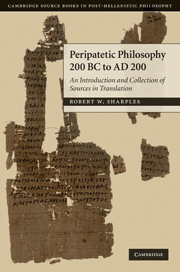Book contents
- Frontmatter
- Contents
- Preface
- Abbreviations
- Introduction
- Individuals
- Logic and ontology
- Ethics
- Chapter 15 An account of Peripatetic ethics
- Chapter 16 Emotions
- Chapter 17 The primary natural things
- Chapter 18 Bodily and external goods and happiness
- Physics
- Bibliography
- Index of sources
- Index of passages cited
- Index of personal names (ancient)
- General index
Chapter 16 - Emotions
Published online by Cambridge University Press: 05 June 2012
- Frontmatter
- Contents
- Preface
- Abbreviations
- Introduction
- Individuals
- Logic and ontology
- Ethics
- Chapter 15 An account of Peripatetic ethics
- Chapter 16 Emotions
- Chapter 17 The primary natural things
- Chapter 18 Bodily and external goods and happiness
- Physics
- Bibliography
- Index of sources
- Index of passages cited
- Index of personal names (ancient)
- General index
Summary
Philodemus, On Anger XXXI.31–9 Wilke 1914
At any rate some of the Peripatetics, as indeed we mentioned previously naming persons, say that those who remove anger and spirit [thumos] from the soul are cutting out its sinews; without these there is no punishment or self-defence.
Cicero, Tusculan Disputations 3.22
For the Peripatetics, associates of ours and unsurpassed in breadth, learning and seriousness, do not at all convince me of their ‘moderations’ [mediocritates] either of disturbances or of diseases of the mind. For every evil, even if it is moderate [mediocre] is an evil; but our concern is that there should be no evil at all in the wise person. For just as the body, even if it is moderately ill, is not healthy, so in the mind that ‘moderation’ is without health.
- Type
- Chapter
- Information
- Peripatetic Philosophy, 200 BC to AD 200An Introduction and Collection of Sources in Translation, pp. 134 - 149Publisher: Cambridge University PressPrint publication year: 2010

